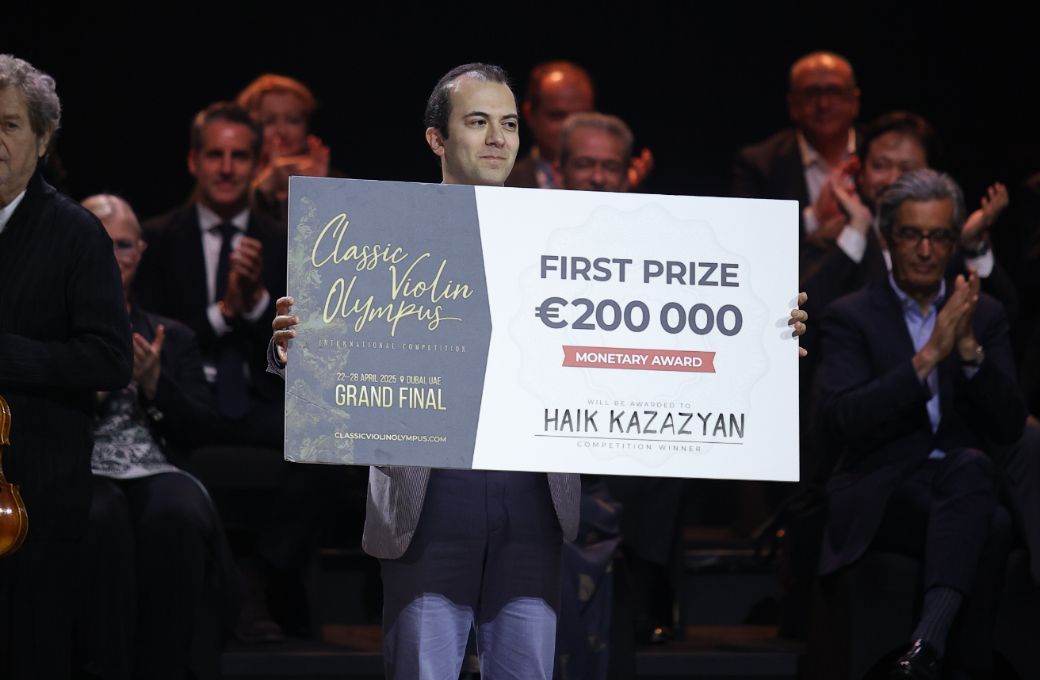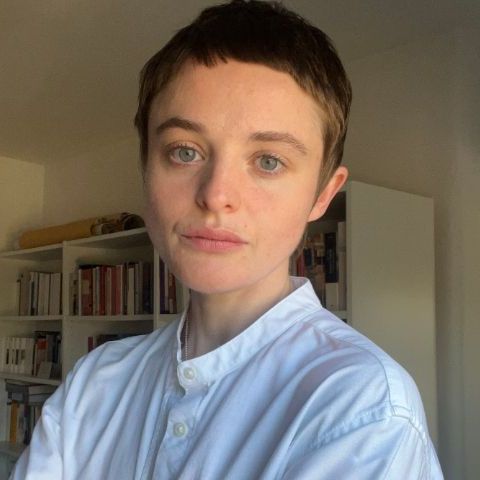Last month, Haik Kazazyan (42) of Armenia, triumphed over eleven fellow finalists at the inaugural Classic Violin Olympus, a week-long competition held at the opulent Zabeel Saray hotel in Dubai. Kazazyan won both of CVO’s main prizes: for overall best performer, and for best rendition of a piece by the event’s composer-in-residence Alexey Shor. Amid a crowded field of talent, he was particularly praised for the choice and delivery of his encore: Rachmaninov’s Prelude in G minor, arranged for violin by Frank Peter Zimmermann. He spoke to us a fortnight later, over video call from a hotel room in Novosibirsk, during a brief pause in a dizzying schedule of performances the violinist now has in his itinerary.

Winning had been “a shocking situation, unbelievable”, for the veteran musician, a Queen Elisabeth Competition candidate in 2012 and now part of the faculty at the Moscow Conservatory. Having been called to perform in Mauritius immediately after, he was only just beginning to digest his achievement in the Gulf. The location’s climate had presented some challenges: Kazazyan was the last to play in the CVO schedule, his appearance coincident with some of the hottest weather of the week, when the mercury soared to 42 degrees Celcius. Even within the air-conditioned hall of the hotel theatre, the humidity had caused practical difficulties, particularly with finger work.
Kazazyan surmises such tribulations were a result of the still-emerging reputation of Dubai as a venue for classical music. While CVO’s ‘sister’ event, InClassica, had managed to secure a slot at the Dubai Opera, the competition had had to make do with a less established – and less professional – setting. The lack of alternative venues in the Emirati state, which mostly comprises a strip of luxury development properties arranged between desert and ocean, would soon change, Kazazyan hopes. “Dubai is a place that’s improving a lot in every sphere,” nevertheless, “it takes time to bring classical music culture somewhere; it’s not like one day you play Vivaldi’s Four Seasons and the next day the crowd wants to listen to a Mahler Symphony”.
One of the much-discussed elements of the competition was its lack of upper age limit. Kazazyan was part of a cohort of mature performers at CVO, whose careers – arguably – would benefit less from a ‘jump start’ at the podium. A €200,000 cash trophy, with an extra €10,000 for the Shor prize, was another evident reason to compete, however. “We had a lot of interviews [about this] during the competition,” Kazazyan recalls, “and we were talking to each other about it too. I said, ‘you know guys, of course the money is huge. But you get the prize or you don’t. What’s most important is that more people get to see and hear you perform. This will lead to a lot of invitations to perform, and this is what’s most important.’”
Such exposure was, Kazazyan argues, the raison d’être for CVO itself. The competition’s panel was made up, for the most part, not of the usual coterie of soloists but rather industry insiders such as agents, conductors and orchestra managers. Had it been conservatory professors, instead, the opportunities to emerge from the week would have been more limited; teachers lack the ability to extend invitations, “even if they’d like to”, but conductors were permitted their choice of participating candidates, while managers could arrange the logistics. “This is, I think, the goal, for us as musicians – to get management. You know, we have a lot of examples in competition history where people win and, okay, perhaps have one good year, and then it’s gone.”
The prize-giving ceremony had allowed for each of the judges to hand out personal awards to the competitors, usually invitations to perform with associated orchestras; this was the critical outcome for Kazazyan and, would, he hoped, create a domino effect for all CVO finalists, regardless of career-stage. “You are invited to one place to perform. And after you perform there, the next day you get a message: okay, Haik, are you free next season, this date…? Of course, this has happened to me, luckily, many times in my life. And then you understand that people really liked you, and they want you to come back very soon. And this is what’s going to work. This is the best thing that could happen from this competition.”
Perhaps understandably given the scale of his victory, Kazazyan was bursting with praise for the organizers: “Konstantin Ishkhanov [President of CMDI, the business behind CVO and InClassica] is really a very clever guy to be able to organize all this, and to bring together all these musicians. And – I know they’re very good friends – he also found Alexey Shor, a fantastic composer that now is very well known in the world, and so we performed his works.” Having appeared at InClassica in Dubai in 2021, Kazazyan was familiar with both Shor’s compositions and the man himself and recounted a past conversation with the composer in which he told him, “‘your music is very special. The performer always needs to put his heart and soul into it and then it becomes fantastic. If, you know, someone just puts out the scores and starts reading, for example, it becomes nothing.’ And he totally agreed with me. He said, ‘Yes, of course. It’s absolutely like that.’”
The simplicity of Shor’s work is, Kazazyan tells me, the key to its success: “you know, there are some works you have to maybe lose half an hour simply to understand which fingers you should use for each phrase.” Shor’s music is different. “It’s very simple – I would say, violinistic. It’s really good to play… Alexey’s melodies are, really, they’re quite simple.”
Had there, by contrast, been any notable technical challenges during the competition? For the winner, the trickiest section had been the concertmaster round, an unusual addition where candidates had to demonstrate their abilities leading from within the orchestra, as opposed to the concertante solos from Brahms, Sibelius and Tchaikovsky. “It was the first time in my life I performed Strauss’ Ein Heldenleben.” The elaborate tone poem, a thinly-veiled autobiography of Richard Strauss himself, uses the concertmaster’s solo violin to represent the heroic protagonist’s wife. “Of course, I knew this music before, but not in such detail. For example, beside each phrase, Strauss writes some words on how it should be performed. But it’s so interesting what he wants to say, and really, it’s absolutely genius music.”
When it came to the choice of encore, Rachmaninov’s Prelude in G minor, Kazazyan’s inspiration came from a strikingly modern source: YouTube, a site he loves and says he “lives on”. “Several years ago, I found Franz Peter Zimmermann playing on YouTube – sometimes I find really unusual and interesting classical music [there].” Having performed it before, he felt the urge to bring it to the stage in Dubai, but worried the jury might be put off by the work’s eccentricities, “because the violin cannot support, or transfer, all the energy and bass notes of a piano.” Pianist colleagues encouraged him to go ahead anyway, assuring him that the piece sounded surprisingly good. In the end, Kazazyan’s worries proved unfounded. One jury member, on inviting him to perform next year – part of a tour that will take him across Europe and China – had but one request: that Kazazyan perform Rachmaninov’s Prelude when he comes to town.
See more about the Classic Violin Olympus Competition.
This article was sponsored by the Classical Music Development Initiative.


